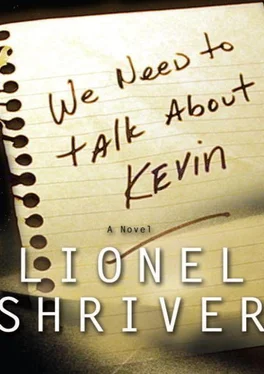You plopped onto an end of our impractical white couch, head in hands; I couldn’t join you, because the other end was still smeared brown. “I’m pretty much at the end of my rope, too, Eva.” You massaged your temples. “But not because of Kevin.”
“Is that a threat?—”
“It’s not a threat—”
“What are you talking about!—”
“Eva, please calm down. I’m never going to break up our family.” There was a time you’d have said instead, I’ll never leave you . Your more rectitudinous declaration had a solidity about it, where pledges of everlasting devotion to a lover are notoriously frail. So I wondered why your bedrock commitment to our family made me sad.
“I dress him,” I said. “I feed him when he lets me, I ferry him everywhere. I bake his kindergarten snacks. I’m at his beck from morning to night. I change his diapers six times a day, and all I hear about is the one afternoon that he so disturbed me, even frightened me, that I couldn’t bear to come near him. I wasn’t exactly trying to punish him. But in that bathroom, he seemed so, ah—” I discarded three or four adjectives as too inflammatory, then finally gave up. “Changing him was too intimate.”
“Listen to yourself. Because I have no idea what kid you’re talking about. We have a happy, healthy boy. And I’m beginning to think he’s unusually bright.” (I stopped myself from interjecting, That’s what I’m afraid of .) “If he sometimes keeps to himself, that’s because he’s thoughtful, reflective. Otherwise, he plays with me, he hugs me good night, I read him stories. When it’s just me and him, he tells me everything—”
“Meaning, he tells you what?”
You raised your palms. “What he’s been drawing, what they had for snack—”
“And you think that’s telling you everything .”
“Are you out of your mind? He’s five years old, Eva, what else is there to tell?”
“For starters? What happened last year, in that after-preschool play group. One after another, every mother took her kids out. Oh, there was always some excuse—Jordan keeps catching colds, Tiffany is uncomfortable being the youngest. Until it’s down to just me and Lorna’s kids, and she mumbles something about it not being much of a group anymore and calls it quits. A few weeks later I stop by Lorna’s unannounced to drop off a Christmas present? All the old play group is reassembled in her living room. She was embarrassed and we didn’t address it, but since Kevin tells you everything why not get him to explain what might drive all those mothers to sneak off and reconvene in secret, all to exclude our ‘happy, healthy’ son.”
“I wouldn’t ask him because that’s an ugly story that would hurt his feelings. And I don’t see the mystery—gossip and cliquishness and smalltown fallings out. Typical of stay-at-home mothers with time on their hands.”
“I’m one of those s tay-at-home mothers, at considerable sacrifice I’d remind you, and the last thing we have is time on our hands.”
“So he was blackballed! Why doesn’t that make you angry at them? Why assume it was something our son did, and not some neurotic hen with a bug up her ass?”
“Because I’m all too well aware that Kevin doesn’t tell me everything . Oh, and you could also ask him why not one baby-sitter will come back a second night.”
“I don’t need to. Most teenagers around here get an allowance of $100 a week. Only 12 bucks an hour isn’t very tempting.”
“Then at least you could get your sweet, confiding little boy to tell you just exactly what he said to Violetta. ”
It’s not as if we fought all the time. To the contrary, though, it’s the fights I remember; funny how the nature of a normal day is the first memory to fade. I’m not one of those sorts, either, who thrives on turmoil—more’s the pity, as it turns out. Still, I may have been glad to scratch the dry surface of our day-to-day peaceableness the way Violetta had clawed the sere crust on her limbs, anything to get something bright and liquid flowing again, out in the open and slippery between our fingers. That said, I feared what lay beneath. I feared that at bottom I hated my life and hated being a mother and even in moments hated being your wife, since you had done this to me, turned my days into an unending stream of shit and piss and cookies that Kevin didn’t even like.
Meanwhile, no amount of shouting was resolving the diaper crisis. In a rare inversion of our roles, you were apt to regard the problem as all very internally complicated, and I thought it was simple: We wanted him to use the toilet, so he wouldn’t. Since we weren’t about to stop wanting him to use the toilet, I was at a loss.
You doubtless found my usage of the word war preposterous. But in corralling Kevin to the changing table—now small for the purpose; his legs dangled over its raised flap—I was often reminded of those scrappy guerrilla conflicts in which underequipped, ragtag rebel forces manage to inflict surprisingly serious losses on powerful armies of state. Lacking the vast if unwieldy arsenal of the establishment, the rebels fall back on cunning. Their attacks, while often slight, are frequent, and sustained aggravation can be more demoralizing over time than a few high-casualty spectaculars. At such an ordnance disadvantage, guerrillas use whatever lies at hand, sometimes finding in the material of the everyday a devastating dual purpose. I gather that you can make bombs, for example, out of methanating manure. For his part, Kevin, too, ran a seat-of-the-pants operation, and Kevin, too, had learned to form a weapon from shit.
Oh, he submitted to being changed placidly enough. He seemed to bask in the ritual and may have inferred from my growing briskness a gratifying embarrassment, for swabbing his tight little testicles when he was nearly six was beginning to feel risqué.
If Kevin enjoyed our trysts, I did not. I have never been persuaded that even an infant’s effluents smell precisely “sweet”; a kindergartner’s feces benefit from no such reputation. Kevin’s had grown firmer and stickier, and the nursery now exuded the sour fug of subway tunnels colonized by the homeless. I felt sheepish about the mounds of nonbiodegradable Pampers we contributed to the local landfill. Worst of all, some days Kevin seemed deliberately to hold his intestines in check for a second strike. If no Leonardo of the crayon world, he had a virtuoso’s command of his sphincter.
Mind, I’m setting the table here, but hardly excusing what happened that July. I don’t expect you to be anything but horrified. I’m not even asking your forgiveness; it’s late for that. But I badly need your understanding.
Kevin graduated from kindergarten in June, and we were stuck with one another all summer. (Listen, I got on Kevin’s nerves as much as he got on mine.) Despite Miss Fabricant’s modest successes with Drano illustrations, the Montessori method was not working wonders in our home. Kevin had still not learned to play. Left to entertain himself, he would sit like a lump on the floor with a moody detachment that turned the atmosphere of the whole house oppressive. So I tried to involve him in projects, assembling yarn and buttons and glue and scraps of colorful fabric in the playroom for making sock puppets. I’d join him on the carpet and have a cracking good time myself, really, except in the end I would have made a nibbling rabbit with a red felt mouth and big floppy blue ears and drinking-straw whiskers, and Kevin’s arm would sport a plain knee-high dipped in paste. I didn’t expect our child to necessarily be a crafts wunderkind, but he could at least have made an effort.
I also tried to give him a jump on first grade by tutoring him on the basics. “Let’s work on our numbers!” I’d propose.
Читать дальше












